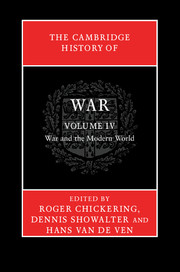Book contents
- Frontmatter
- Contents
- Illustrations
- Maps
- Notes on contributors
- Introduction to volume IV
- Part I The industrialization of warfare, 1850–1914
- Part II The Era of Total War, 1914–1945
- Part III Post-total warfare, 1945–2005
- 17 Military occupations, 1945–1955
- 18 The wars after the war, 1945–1954
- 19 Weapons technology in the two nuclear ages
- 20 Conventional war, 1945–1990
- 21 Wars of decolonization, 1945–1975
- 22 War and memory since 1945
- 23 The era of American hegemony, 1989–2005
- Select bibliography
- Index
- References
20 - Conventional war, 1945–1990
from Part III - Post-total warfare, 1945–2005
Published online by Cambridge University Press: 05 December 2012
- Frontmatter
- Contents
- Illustrations
- Maps
- Notes on contributors
- Introduction to volume IV
- Part I The industrialization of warfare, 1850–1914
- Part II The Era of Total War, 1914–1945
- Part III Post-total warfare, 1945–2005
- 17 Military occupations, 1945–1955
- 18 The wars after the war, 1945–1954
- 19 Weapons technology in the two nuclear ages
- 20 Conventional war, 1945–1990
- 21 Wars of decolonization, 1945–1975
- 22 War and memory since 1945
- 23 The era of American hegemony, 1989–2005
- Select bibliography
- Index
- References
Summary
On September 2, 1945, the voice of Douglas MacArthur echoed across the decks of the battleship, the USS Missouri: “It is my hope and the hope of all mankind that from this occasion a better world shall emerge out of the blood and carnage of the past – a world . . . dedicated to freedom, tolerance, and justice.”
In fact, however, war continued to stalk the globe. The purpose of this chapter is to recount and contextualize the more important of these wars – the conventional ones, those that primarily used “traditional” methods and material. They occupy the still-wide area between “fourth-generation conflict” and war by remote control. The chapter omits what might be called “dead-end” encounters – the Indo-Pakistani wars, the Sino-Vietnamese and Sino-Russian encounters of the 1960s and 1970s, and the Falklands War. It omits as well low-end, fundamentally irregular conflicts like Malaya and Algeria. It concentrates instead on conventional conflicts that made – and still make – waves.
The war that defined this period, the Cold War between the Soviet Union and the United States, began almost immediately after World War II and lasted for forty-five years, until the Soviet system collapsed, burned out by unsustainable military expenditures and a hopeless economic system. The conduct of the Cold War provided much of the context of the other conflicts around the world after 1945.
- Type
- Chapter
- Information
- The Cambridge History of War , pp. 493 - 514Publisher: Cambridge University PressPrint publication year: 2012



